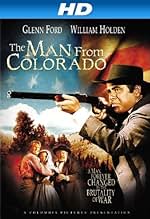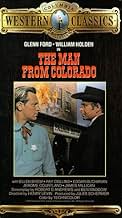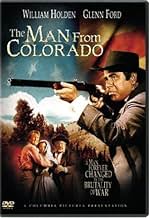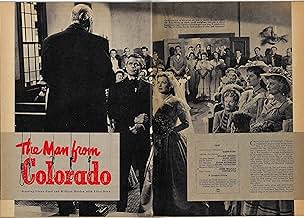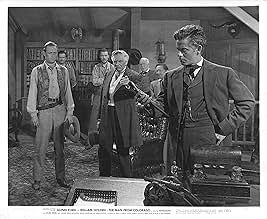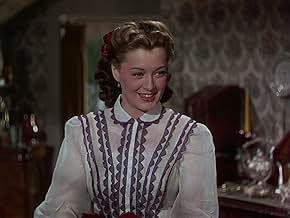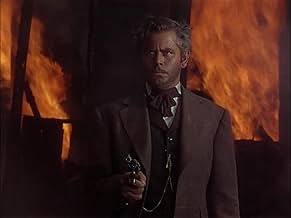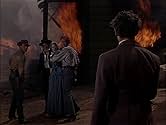CALIFICACIÓN DE IMDb
6.6/10
2.1 k
TU CALIFICACIÓN
Al final de la Guerra Civil, dos amigos regresan a Colorado y uno de ellos ha cambiado y es violento y errático.Al final de la Guerra Civil, dos amigos regresan a Colorado y uno de ellos ha cambiado y es violento y errático.Al final de la Guerra Civil, dos amigos regresan a Colorado y uno de ellos ha cambiado y es violento y errático.
- Dirección
- Guionistas
- Elenco
- Premios
- 1 nominación en total
William 'Bill' Phillips
- York
- (as Wm. 'Bill' Phillips)
Stanley Andrews
- Roger MacDonald
- (sin créditos)
Emile Avery
- Townsman
- (sin créditos)
Walter Bacon
- Townsman
- (sin créditos)
Walter Baldwin
- Tom Barton
- (sin créditos)
Symona Boniface
- Matron
- (sin créditos)
Chet Brandenburg
- Party Guest
- (sin créditos)
James Bush
- Cpl. Dixon
- (sin créditos)
Nora Bush
- Townswoman
- (sin créditos)
Boyd Cabeen
- Townsman
- (sin créditos)
- Dirección
- Guionistas
- Todo el elenco y el equipo
- Producción, taquilla y más en IMDbPro
Opiniones destacadas
One of several morose postwar westerns addressing the untidy aftermath of the Civil War, incongruously shot in pristine Technicolor; all the better, presumably, for Columbia to showcase it's fresh young stars. Glen Ford and Bill Holden.
Ford - giving the strangest performance he probably ever gave as the psychotic sheriff - was in reality two years older than Holden; but the grey-templed hairpiece Ford wears (either to make him look older or to show the toll the war has taken on him) actually makes him look even younger.
Ford - giving the strangest performance he probably ever gave as the psychotic sheriff - was in reality two years older than Holden; but the grey-templed hairpiece Ford wears (either to make him look older or to show the toll the war has taken on him) actually makes him look even younger.
"The Man From Colorado" opens in the closing days of the American Civil War. Two life long friends, Col. Owen Deveraux (Glenn Ford) and Capt. Del Stewart (William Holden) along with their troop corner a group of tired, poorly armed Confederate soldiers. They raise a white flag of surrender but Deveraux refuses to acknowledge it (unknown to the others) and orders his troops to open fire. The Confederates are all killed except for one officer.
Stewart senses that his friend is becoming psychotic but attributes it to the pressures of war. Later they return to their home town and are given a heroes welcome. The surviving Confederate officer confronts Deveraux who shoots him down with a wild look in his eyes. Meanwhile, big time mine boss Ed Carter (Ray Collins) and the Governor's representative (Stanley Andrews) offer Deveraux the position of Federal Judge. He accepts and appoints Stewart as Federal Marshal.
Most of Deveraux's troops had gold mining claims prior to going off to war. During their three year absence Carter has through a legal loophole, taken over their claims. Judge Deveraux is forced to side with Carter. This causes some of the men led by Jericho Howard (James Millican) to take to the hills and rob Carter's mining company, stealing the gold they believe to be rightfully theirs.
Jericho's kid brother Johnny (Jerome Courtland) is found with a bag of gold following a robbery during which a man was killed. Deveraux under pressure to produce the guilty parties, orders him jailed. Stewart believes in the boy's innocence and sets out to find Jericho in order to prove it. During Stewart's absence Deveraux holds a speedy trial and hangs Johnny. When Del returns he is appalled and turns in his badge and joins Jericho and his gang. This leads to further robberies until the inevitable confrontation between the two men where.............
Glenn Ford playing against type, gives one of the best performances of his career as the psychotic Deveraux. His facial expressions of increasing madness are terrifying. Holden does his best in effectively what is a supporting role, as the good friend. Ellen Drew appears as the woman both men love but who marries Deveraux only to experience first hand, his increasing madness.
Also in the cast are Edgar Buchanan as Doc Merriam, Jim Bannon as Carter's henchman Nagel and western regulars Ian MacDonald, Myron Healey, Denver Pyle and Ray Teal in other roles.
Worth a look just to catch Ford's performance.
Stewart senses that his friend is becoming psychotic but attributes it to the pressures of war. Later they return to their home town and are given a heroes welcome. The surviving Confederate officer confronts Deveraux who shoots him down with a wild look in his eyes. Meanwhile, big time mine boss Ed Carter (Ray Collins) and the Governor's representative (Stanley Andrews) offer Deveraux the position of Federal Judge. He accepts and appoints Stewart as Federal Marshal.
Most of Deveraux's troops had gold mining claims prior to going off to war. During their three year absence Carter has through a legal loophole, taken over their claims. Judge Deveraux is forced to side with Carter. This causes some of the men led by Jericho Howard (James Millican) to take to the hills and rob Carter's mining company, stealing the gold they believe to be rightfully theirs.
Jericho's kid brother Johnny (Jerome Courtland) is found with a bag of gold following a robbery during which a man was killed. Deveraux under pressure to produce the guilty parties, orders him jailed. Stewart believes in the boy's innocence and sets out to find Jericho in order to prove it. During Stewart's absence Deveraux holds a speedy trial and hangs Johnny. When Del returns he is appalled and turns in his badge and joins Jericho and his gang. This leads to further robberies until the inevitable confrontation between the two men where.............
Glenn Ford playing against type, gives one of the best performances of his career as the psychotic Deveraux. His facial expressions of increasing madness are terrifying. Holden does his best in effectively what is a supporting role, as the good friend. Ellen Drew appears as the woman both men love but who marries Deveraux only to experience first hand, his increasing madness.
Also in the cast are Edgar Buchanan as Doc Merriam, Jim Bannon as Carter's henchman Nagel and western regulars Ian MacDonald, Myron Healey, Denver Pyle and Ray Teal in other roles.
Worth a look just to catch Ford's performance.
The end of the Civil War is nigh and one last pocket of Confederate resistance is holed up at Jacob's Gorge. Knowing their time is up they hoist the white flag in surrender. Union Colonel Owen Devereaux sees the white flag but orders the attack anyway. Returning home with his friend and colleague, Capt. Del Stewart, Devereaux grows ever more erratic by the day, his friends, his loves and all who cross him, are sure to pay if they can't rein in his madness.
Starring Glenn Ford as Devereaux and William Holden as Stewart, directed by Henry Levin, The Man from Colorado, from a story by Borden Chase, is an intriguing psychological Western. The story follows the theme of a man ravaged by war and his inability to let go of the anger and mistrust gnawing away at him. Perfectly essayed by Ford as Devereaux (great to see him donning some bad guy boots), the film is rather grim in context. Light on action (no bad thing here at all) it's with the dialogue driven characters that Levin's film really triumphs. Having both become lawmen, it would have been easy for all to just play out a standard oater as the two friends are driven apart by not only their different levels of sanity (Holden's Stewart is an excellent counter point to Ford's blood thirst), but also the love of a good woman (Ellen Drew's petite Caroline Emmet). However, Chase's story has other elements to keep it from ever being formulaic. There's a deep political thread involving power and those entrusted with it, while the treatment of returning soldiers is firmly given prominence. Here the "boys" return after 3 years of being knee deep in blood and bone, to find that their claims are no longer valid. Snaffled by a greedy corporate type, thus as the "boys" look to the law for help?...
As a story it has substance of depth, how nice to also find that there are smart technical aspects to harness the screenplay. The Simi Valley location work is fabulous, most appealing. William E. Snyder's cinematography work is top draw, arguably his best work in the Western genre. It's fair to say that even a "c" grade Western can look nice if given a good transfer, but when the Technicolor print is good, you can tell the difference big time, and this piece is first rate. The dusty orange and browns of the scenery fabulously envelopes the blue uniforms, while the green and gold glow lamps are vivid and shine bright as if extra characters in the piece. Even Ford's greying temples have a classy sheen to them, almost belying his characters anger. All Western fans simply must hone into High Definition TV because although we always knew how fabulous these pictures looked, now it's another dimension of rewards unbound.
As the finale comes in a blaze of fire (welcome to hell!), The Man from Colorado has achieved the two essential Western requirements if it wants to be taken seriously - one is that it looks gorgeous, the other is that it has strong thematics to drive it forward - this has both. Hooray! 8/10
Starring Glenn Ford as Devereaux and William Holden as Stewart, directed by Henry Levin, The Man from Colorado, from a story by Borden Chase, is an intriguing psychological Western. The story follows the theme of a man ravaged by war and his inability to let go of the anger and mistrust gnawing away at him. Perfectly essayed by Ford as Devereaux (great to see him donning some bad guy boots), the film is rather grim in context. Light on action (no bad thing here at all) it's with the dialogue driven characters that Levin's film really triumphs. Having both become lawmen, it would have been easy for all to just play out a standard oater as the two friends are driven apart by not only their different levels of sanity (Holden's Stewart is an excellent counter point to Ford's blood thirst), but also the love of a good woman (Ellen Drew's petite Caroline Emmet). However, Chase's story has other elements to keep it from ever being formulaic. There's a deep political thread involving power and those entrusted with it, while the treatment of returning soldiers is firmly given prominence. Here the "boys" return after 3 years of being knee deep in blood and bone, to find that their claims are no longer valid. Snaffled by a greedy corporate type, thus as the "boys" look to the law for help?...
As a story it has substance of depth, how nice to also find that there are smart technical aspects to harness the screenplay. The Simi Valley location work is fabulous, most appealing. William E. Snyder's cinematography work is top draw, arguably his best work in the Western genre. It's fair to say that even a "c" grade Western can look nice if given a good transfer, but when the Technicolor print is good, you can tell the difference big time, and this piece is first rate. The dusty orange and browns of the scenery fabulously envelopes the blue uniforms, while the green and gold glow lamps are vivid and shine bright as if extra characters in the piece. Even Ford's greying temples have a classy sheen to them, almost belying his characters anger. All Western fans simply must hone into High Definition TV because although we always knew how fabulous these pictures looked, now it's another dimension of rewards unbound.
As the finale comes in a blaze of fire (welcome to hell!), The Man from Colorado has achieved the two essential Western requirements if it wants to be taken seriously - one is that it looks gorgeous, the other is that it has strong thematics to drive it forward - this has both. Hooray! 8/10
Best friends Owen and Del, along with local men, are mustered out of the Union army at Civil War's end. Trouble is Big Ed has grabbed the men's gold-bearing land while the men were gone, and now, as a judge, Owen has to enforce the law in Big Ed's favor. This splits the community into warring factions.
Gritty, character-driven western. We know at outset that Owen (Ford) is a flawed character when his Union detachment shells surrendering Johnny rebs. In fact, Owen hides his killer instinct behind an uptight rendering of authority, whether as a colonel or as a federal judge. Ford plays the authoritarian part so grimly (count the smiles—I stopped at zero), it's hard to see how the charming Caroline would be attracted to him. Nonetheless, the interplay between best-friends Ford and Holden is involving and forms the story's core. Alliances between the various factions are sometimes hard to keep up with, but are more unpredictable than usual. And I especially like that final maneuvering around the bridge that I didn't see coming.
Columbia Studios popped for a lot of extras, along with fine special effects, especially when the burning wall comes down. Funny, though, how mountainous Colorado looks like greater LA. Too bad Columbia didn't pop for sending the crew at least to Lone Pine and the Southern Sierras. All in all, it's a very different kind of horse opera that avoids the usual clichés, with Ford at his absolute grimmest. Clearly, however, he and Holden are on their way up the Hollywood ladder.
Gritty, character-driven western. We know at outset that Owen (Ford) is a flawed character when his Union detachment shells surrendering Johnny rebs. In fact, Owen hides his killer instinct behind an uptight rendering of authority, whether as a colonel or as a federal judge. Ford plays the authoritarian part so grimly (count the smiles—I stopped at zero), it's hard to see how the charming Caroline would be attracted to him. Nonetheless, the interplay between best-friends Ford and Holden is involving and forms the story's core. Alliances between the various factions are sometimes hard to keep up with, but are more unpredictable than usual. And I especially like that final maneuvering around the bridge that I didn't see coming.
Columbia Studios popped for a lot of extras, along with fine special effects, especially when the burning wall comes down. Funny, though, how mountainous Colorado looks like greater LA. Too bad Columbia didn't pop for sending the crew at least to Lone Pine and the Southern Sierras. All in all, it's a very different kind of horse opera that avoids the usual clichés, with Ford at his absolute grimmest. Clearly, however, he and Holden are on their way up the Hollywood ladder.
Colorado was a large, booming territory in 1865. It did not enter the union until eleven years later, and as the only new state to get admission in 1876 it has the right to remain our "Centennial" State (for the centennial of the Declaration of Independence). In the Civil War there were few engagements in Colorado, but one that did stick out was a massacre (there is no other way of putting it) of Indians by a Colonel Chivington at Sands Creek. Chivington's daughter had been raped by an Indian, and he took advantage of a relatively mild act of legal disobedience by the Indians to kill a good number of them.
"The Man From Colorado" is not dealing directly with the Sands Creek Massacre (no Indians are involved in the story). Instead, Chivington's character is transferred to Glenn Ford, who in the closing days of the Civil War perpetrates a similar atrocity, this time on surrendering Confederates. Ford and his friend William Holden have been through the whole war together, but Holden has managed to retain a sense of balance despite the horrors he has seen. Ford is on a slippery slope. Even after the atrocity he is still aware of his act of cruelty and writes in his diary about it. He can't control himself anymore.
Unfortunately his war record stands him well with the richest men in the territory, especially Ray Collins. Collins has managed to get control of the claims that should be used to pay the ex-Union troops. He wants a strong man to be the Federal judge of Colorado territory. Who better than the no-nonsense Ford? So Ford gets the judicial position. Holden has lost his old girlfriend (Ellen Drew) to Ford, but he remains a friend. However he and Drew are increasingly aware of Ford's mental instability. So is everyone (except Ray Collins), as Ford keeps giving the most draconian decisions from the bench. In particular to his former soldiers, now fighting to get back their claims. This, of course leads to their becoming bandits. A vicious cycle, of course. Holden and Drew may be able to break it - Drew has seen Ford's diary.
In the wake of World War II's returning men, and the many suffering psychological trauma, "The Man From Colorado" was a timely film. Ford never played a psychotic type as well as here. Holden (actually in a supporting role - before his burst into super stardom) is a great balance to Ford. Rains performs well as do most of the cast. And by the time the holocaust unleashed by Ford's appointment to the bench is finished, even Ray Collins wishes he never was dumb enough to put this man on the bench.
"The Man From Colorado" is not dealing directly with the Sands Creek Massacre (no Indians are involved in the story). Instead, Chivington's character is transferred to Glenn Ford, who in the closing days of the Civil War perpetrates a similar atrocity, this time on surrendering Confederates. Ford and his friend William Holden have been through the whole war together, but Holden has managed to retain a sense of balance despite the horrors he has seen. Ford is on a slippery slope. Even after the atrocity he is still aware of his act of cruelty and writes in his diary about it. He can't control himself anymore.
Unfortunately his war record stands him well with the richest men in the territory, especially Ray Collins. Collins has managed to get control of the claims that should be used to pay the ex-Union troops. He wants a strong man to be the Federal judge of Colorado territory. Who better than the no-nonsense Ford? So Ford gets the judicial position. Holden has lost his old girlfriend (Ellen Drew) to Ford, but he remains a friend. However he and Drew are increasingly aware of Ford's mental instability. So is everyone (except Ray Collins), as Ford keeps giving the most draconian decisions from the bench. In particular to his former soldiers, now fighting to get back their claims. This, of course leads to their becoming bandits. A vicious cycle, of course. Holden and Drew may be able to break it - Drew has seen Ford's diary.
In the wake of World War II's returning men, and the many suffering psychological trauma, "The Man From Colorado" was a timely film. Ford never played a psychotic type as well as here. Holden (actually in a supporting role - before his burst into super stardom) is a great balance to Ford. Rains performs well as do most of the cast. And by the time the holocaust unleashed by Ford's appointment to the bench is finished, even Ray Collins wishes he never was dumb enough to put this man on the bench.
¿Sabías que…?
- TriviaColumbia Pictures spent quite a bit on The Man in Colorado. At one point, the crew dynamited the side of a 1500-foot mountain in California's San Fernando Valley in order to create a deep gorge as called for by the script. And the western town they constructed was one of the largest location sets ever built by Columbia up to that time. During filming of a massive fire scene at the end, however, the set caught fire uncontrollably, and Holden and Ford tried to actually fight the fire until firemen could arrive. "Dad came away coated in black soot, with burns to his arms and hands," Ford's son Peter later wrote.
- ErroresMany of the men are wearing trousers with belt loops and belts. Belt loops were not added to men's trousers until the 20th century.
- Citas
Owen Devereaux: [voiceover as he writes in his diary] I killed a hundred men today. I didn't want to. I couldn't help myself. What's wrong with me? I'm afraid... afraid I'm going crazy.
- Créditos curiososOpening credits are listed in the pages of a book being turned by a hand.
- ConexionesFeatured in Noble enemigo (1952)
- Bandas sonorasWhen Johnny Comes Marching Home
(uncredited)
Written by Louis Lambert (pseudonym for Patrick Sarsfield Gilmore)
Played at the homecoming
Selecciones populares
Inicia sesión para calificar y agrega a la lista de videos para obtener recomendaciones personalizadas
- How long is The Man from Colorado?Con tecnología de Alexa
Detalles
Taquilla
- Presupuesto
- USD 1,000,000 (estimado)
- Tiempo de ejecución
- 1h 40min(100 min)
- Color
- Relación de aspecto
- 1.37 : 1
Contribuir a esta página
Sugiere una edición o agrega el contenido que falta


